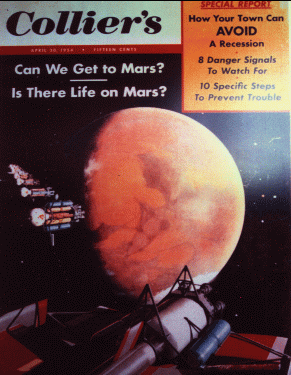Fully Automated Gay Space Communism Is the Future of Humanity
This past week, at the International Space Station R&D conference in Washington, DC, Elon Musk dramatically downsized his vision for colonizing Mars.
Musk explained that Red Dragon was no longer in line with the evolving vision SpaceX has for getting to Mars—specifically, the part where you have to land on Mars. The company is hitting pause on the development of its propulsive landing technology on the Dragon V2 spacecraft. Musk argued that while the technology works, SpaceX would be put through the wringer trying to meet NASA’s safety standards for landing a human crew on the ground.
To rephrase Musk’s rather cover-your-ass framing, he does not have a solid plan for landing humans safely on Mars. Withour current technology, there is only about a 48% success rate for even reaching Mars — successfully landing on the Red Planet, a much more difficult prospect, has only been done successfully about 30% of the time — with proven technology, not the Super Draco thrusters SpaceX has not yet used on a mission. When you are facing a 70% chance of a crash landing with people at risk, NASA is completely right to put in place very high standards of survivability for any human journey there.

I have spent a lot of effort in this space poking holes at the starry-eyed visionariness of Musk for a specific reason: the marketing is, in many ways, actually bad for the bigger goal of getting humanity into space for the long term — something that is super cool and justifiable in any least some ways. And it is frustrating to see a company doing genuinely exciting work — reusable rockets! — also be taken seriously for its insane and impossible dreams that would be more fit for a Collier’s cover drawing rather than anything serious and substantive. One important way the endless cycle of hype, reinforced by breathless fanboys in the techn media, is how a long string of broken promises — SpaceX has not met any of its benchmarks or performance metrics, despite a few recent successes with reusing first stage rockets, to the best I can tell — can delegitimize an idea in the general public. I do wonder if Musk is teetering close to this tipping point — as he has with his other companies (from creative debt restructuring marketed as investment to Tesla’s remarkable inability to turn a profit despite domineering market capitalization) where promise simply does not ever match reality. You can game that system for a while but it has a very short shelf life.
His actual accomplishments deserve so much more respect than the casual way he grabs onto and discards the marketing around them. (I suspect he did not realize how long it takes journals to publish, given his Mars vision was treated lavishly by Scientific American just one month before he repudiated it at the ISSR&D conference.) The Falcon Heavy rocket that undergirds his vision is, Musk admitted, really hard to build — though he did not take back any of the snark he has flung at other rocket builders, including NASA, who have also struggled to build big.
That being said, the new focus — this week, I suppose — on colonizing the Moon first, before Mars, makes much more sense. There isn’t a huge difference in delta-v between going to the Moon and to Mars, but the Moon does take less, and having no atmosphere to accidentally burn up in actually makes landing a lot more straightforward. More importantly, safely sending people to the Moon is something we — NASA — know how to do very well.
But let us actually grapple with Musk’s vision, which I find more interesting and problematic than the routine issue of a former tech mogul overpromising and underdelivering behind a massive hype machine. The future of humanity is interplanetary he says — along with Stephen Hawking and others. And that is great! Humanity would be wonderful if it could leave the bounds of this one planet we call home and set up in new spaces. But — but! — such a monumental, gave undertaking is, again, an idea that deserves serious thought behind it, and not the poorly disguised shallow marketing that Musk has lavished upon it.
I’ve discussed Musk’s vision for an interplanetary society before and called it scary; I’ve noted the built-in need for a permanent underclass, especially if Musk’s vision of wealthy people going first actually pans out; I’ve noted that a government on Mars would most likely require some form of tyranny or military-type hierarchy in order to function; and I’ve addressed how Silicon Valley-style libertarian capitalism actually argues against building colonies in space because they’ll never really generate a profit.
To me, this vision of humanity in space requires thinking beyond replicating the 13 Colonies, but in Valles Marineris (or Oceanus Procellarum). Rather, there should be a more deliberate thinking-through of what sort of economy would exist in a space colony — assuming one is built beyond the research stations that NASA has planned, and which are far more viable and likely to actually exist.
The simple fact of the matter is that any space colony is going to be, in essence, a hydraulic empire. That is, it will be a society whose government will, more or less, control the access to water, air, and food to such a degree that operating outside that government’s purview will be a death sentence (many fiction writers explore what it might be like if that wasn’t totally the case, but I do want to keep this as realism-adjacent as we can despite invoking a form of government that never really existed).
If you sit down and think about what goes into a successful space colony, you have three overriding principles:
- Extremely limited space
Creating livable space in space is really hard to do: structures must be pressurized, hardened against kinetic strikes from debris and radiation from the sun, and until we figure out how to actually manufacture things in space they will be hellishly expensive to deliver from Earth — the ISS, which is the size of a single football field, cost over $150 billion to design and then fling into orbit.
- Extremely limited resources in a closed system
NASA is spending a lot of energy working on [In-Situ Resource Utilization][12], or using local materials to generate life support for a manned mission to deep space. But this is a lot harder than heating space ice to make water and air and propellant. Things like laundry, life-saving medical care, even gas balances in the long run are all big question marks for space.
- An overwhelming imperative to generate life support
Put simply, our robots are not sophisticated enough to automate life support and they will not be for the foreseeable future. Gathering materials to generate life support — picking up ice, vaporizing Martian soil or Lunar regolith, or smelting down silicate rocks to make solar cells — is going to be the primary economic output of any colony for a very long time, and all members of that colony will have to be involved in it, whether it is in generation (e.g. repairing the machines that scrub the air) or in maintenance (e.g. safely cleaning toilets in such a way that there isn’t mass illness), or merely in conservation (e.g. not wasting electricity or water or air so that the long-term viability of the colony is preserved).
There are plenty of other ideas to derive from these three principles. Boredom and depression will be serious problems, because humans are adaptable to new settings and the thrill of being in space will not last more than a couple of weeks (if that). In the Antarctic program, everyone from scientists to fire fighters to retail workers who overwinter at the south pole must fight Polar T3 syndrome, which causes debilitating neuroses. They have it lucky: if they feel badly cooped up, they can pop open a door and get a breath of fresh air — no such relief will ever be possible on a Musk colony. NASA fights this issue by packing astronaut schedules to the minute with tasks to perform: always being busy, except for a few planned personal respites, is vital for maintaining state of mind while in orbit (same with routine physical exercise: endorphins work!). And with the delicate ecological balances needed to maintain both atmosphere, potable water, and bacterial balance in a closed environment, introducing both pregnancy and children (unpredictable behavior, to say nothing of tweaked immune systems and resource strain with more mouths/lungs to fill) seems like a dangerous idea.
That leaves me with only one solution to a political economy of space: fully automated gay space communism.

Thinking this through logically has an inexorable logic:
- Fully Automated
The economy on earth is being increasingly automated, from [manufacturing][13] to [journalism][14] to [programming][15] to [nursing][16].
- Gay
Reproductive freedom is simply not possible in space: the decision to birth a child will fundamentally change the nature and output of the colony, in ways that are impossible to predict. Sure, heterosexuals could submit to birth control (tubal ligation, vasectomy), but these are imperfect. Homosexuals, on the other hand, do not pose a risk of unplanned pregnancy. It would be a built in, social and sexual safeguard against the quite literal killer of unexpected population growth.
- Space Communism
In space, a communistic society is the only one that makes sense. A small space colony would inherently be [communitarian][17], with a shared destiny and the requirement to keep the needs of the community above the needs of any individual (swashbuckling space operas have it so so so wrong). But it would also, by necessity, be communist, with some modifications for being in the unique environment posed by living in space. The colony itself would have to own the means of production for water, air, and food, but those utilities must be freely accessible by everyone. It cannot be capitalistic, because that would create an inherent class conflict between the workers who may not be able to afford access to water and air, and the ruling class who would hoard it for themselves. In addition, because almost everything would have to be manufactured locally — eventually — due to the extreme cost of importing from Earth, and because that manufacturing would be automatic, there is no inherent reason to restrict those goods through pricing and income.
This concept is the subject of memes for a bunch of reasons, ranging from disaffectation with American politics to an unfocused desire to escape what feels, some days, like impending doom for the planet. But there is real merit to designing a society in space along these principles — one that might not be the unregulated libertarian paradise billionaires like Musk dream for, but one that actually has a chance of successfully existing in the most extreme environment we can think of.
Stay tuned in this space; there are a lot more ideas around this to suss out. Luckily, there is plenty of inspiration to be had in science fiction for this concept, and in the future I’ll be drawing from it to discuss how some of these ideas might work.